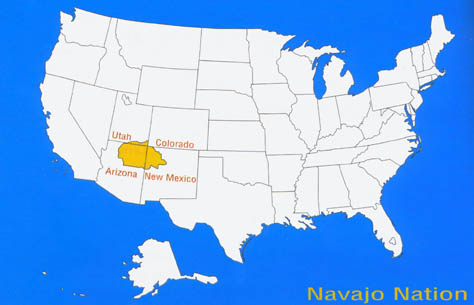
Joe Shirley Jr., President of the Navajo Nation
I’m not (by any stretch of the imagination) an expert on Native American affairs, but there is an interesting and rather sad drama playing out in the Navajo Nation (a semi-autonomous Native American homeland covering parts of Arizona, Utah and New Mexico). The Nation also encompasses the Hopi Reservation, represented by the Hopi Tribal Council. Here is a USA Today article of September 30, 2009, in part:
PHOENIX — The president of the Navajo Nation joined other Native American leaders this week in assailing environmentalists who have sought to block or shut down coal-fired power plants that provide vital jobs and revenue to tribes in northern Arizona.
“These are individuals and groups who claim to have put the welfare of fish and insects above the survival of the Navajo people when in fact their only goal is to stop the use of coal in the U.S. and the Navajo Nation,” said Navajo Nation President Joe Shirley Jr., who presides over America’s largest Indian reservation, which sprawls over three states and claims a population of about 250,000.
Shirley’s remarks came Wednesday after the Hopi Nation‘s Tribal Council sent a message Monday to the Sierra Club and a handful of other environmental groups: Stay off the reservation.”
Shirley also said in another statement: “Environmentalists are good at identifying problems but poor at identifying feasible solutions. Most often they don’t try to work with us but against us, giving aid and comfort to those opposed to the sovereign decision-making of tribes.” This is an interesting statement in light of the fact that environmental groups worked together with the Hopi Tribe in opposing the proposed uranium mine near the Grand Canyon and securing protection for the desert nesting bald eagle, among other issues.
Nonetheless, for a community with unemployment at 42% (Data from 2000) and poverty at 43%, economic concerns must obviously be a top priority, as Joe Shirley Jr. makes clear. But it is sad when leaders resort to vilifying those who have been working for and with the Hopi (and Navajo) people all along. In the case of the Hopi people it is even more ironic. Vernon Masayesva, executive director of Black Mesa Trust and former Hopi Chairman: “To be a Hopi is to be a conservationist, a caretaker and a steward of planet earth. So, by implication, the Council has banned all Hopi people from their land.” If, for the past forty years, coal has been such a major constituent of the economic lifeblood of the Nation, yet economic problems still abound, what’s the catch?
All of this leads to the question: why the sudden opposition?

Location of the Navajo Nation
As is quite often the case, the answer could lie in the depths of a corporation – in this case Peabody Coal, a mining company which already has major interests within the Navajo Nation. Might Peabody Coal be putting pressure on the Hopi Tribal Council to carry out the agenda of coal within the region? Masayesva thinks so: “The real story on Hopiland, that is yet to be revealed, is the take-over of the government by pro-Peabody legislators with the support of their legal counsel . . . and the ensuing corruption and abuse of power by an illegally constituted Council.” Funnily enough, this isn’t the first instance of something like this happening. You can read about Peabody’s previous efforts here.
President Joe Shirley Jr. and the Hopi Tribal Council must each look beyond the quick-fixes and easy-money offered by coal, especially when these are to the detriment of their people, heritage, and land. Clean and renewable energy solutions are becoming increasingly viable, and will be able to provide green jobs and revenue to be kept by the Navajo and Hopi. In fact, in June this year the Navajo Nation Council passed the Navajo Green Commission Act, which will help to establish green jobs across the Navajo Nation. Why not take this path, and develop it fully? Sole dependence on outside companies, such as Peabody Coal, will allow the economic success of the region to be dictated by these outside sources, and they might not always have the best interests of the Navajo and Hopi at heart.
J Baker.
###
By promoting cleaner energy, cleaner government, cleaner cars, and cleaner air for all Texans, we hope to provide for a healthy place to live and prosper. We are Public Citizen Texas.


